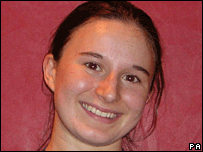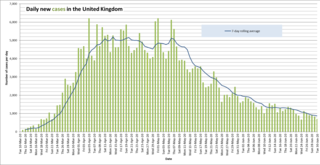Related Research Articles
In English law, unlawful killing is a verdict that can be returned by an inquest in England and Wales when someone has been killed by one or more unknown persons. The verdict means that the killing was done without lawful excuse and in breach of criminal law. This includes murder, manslaughter, infanticide and causing death by dangerous driving. A verdict of unlawful killing generally leads to a police investigation, with the aim of gathering sufficient evidence to identify, charge and prosecute those responsible.
The open verdict is an option open to a coroner's jury at an inquest in the legal system of England and Wales. The verdict means the jury confirms the death is suspicious, but is unable to reach any other verdicts open to them. Mortality studies consider it likely that the majority of open verdicts are recorded in cases of suicide where the intent of the deceased could not be proved, although the verdict is recorded in many other circumstances.
Operation Paget was the British Metropolitan Police inquiry established in 2004 to investigate the conspiracy theories about the death of Diana, Princess of Wales in 1997. The inquiry's first report with the findings of the criminal investigation was published in 2006. The inquiry was wound up following the conclusion of the British inquest in 2008, in which a jury delivered its verdict of an "unlawful killing" by the driver and the pursuing paparazzi.
An inquest is a judicial inquiry in common law jurisdictions, particularly one held to determine the cause of a person's death. Conducted by a judge, jury, or government official, an inquest may or may not require an autopsy carried out by a coroner or medical examiner. Generally, inquests are conducted only when deaths are sudden or unexplained. An inquest may be called at the behest of a coroner, judge, prosecutor, or, in some jurisdictions, upon a formal request from the public. A coroner's jury may be convened to assist in this type of proceeding. Inquest can also mean such a jury and the result of such an investigation. In general usage, inquest is also used to mean any investigation or inquiry.

The Ballymurphy massacre was a series of incidents between 9 and 11 August 1971, in which the 1st Battalion, Parachute Regiment of the British Army killed at least nine civilians in Ballymurphy, Belfast, Northern Ireland, as part of Operation Demetrius. The shootings were later referred to as Belfast's Bloody Sunday, a reference to the killing of civilians by the same battalion in Derry a few months later. The 1972 inquests had returned an open verdict on all of the killings, but a 2021 coroner's report found that all those killed had been innocent and that the killings were "without justification".
Gareth Wyn Williams was a Welsh mathematician and employee of GCHQ seconded to the Secret Intelligence Service who was found dead in suspicious circumstances at a Security Service safe house flat in Pimlico, London, on 23 August 2010. The inquest found that his death was "unnatural and likely to have been criminally mediated." A subsequent Metropolitan Police re-investigation concluded that Williams's death was "probably an accident". Two senior British police sources have said some of Williams's work was focused on Russia – and one confirmed reports that he had been helping the US National Security Agency trace international money-laundering routes that are used by organised crime groups including Moscow-based mafia cells.

Charlotte Shaw was a fourteen-year-old British schoolgirl who drowned while crossing a swollen stream on Dartmoor during training for Ten Tors in 2007. Her death, the first to occur in connection with Ten Tors or one of its training expeditions, made national news headlines in the United Kingdom. She was with a group of students from Edgehill College trekking the route of Ten Tors in training for the main event when the group got into difficulties crossing a stream. Shaw slipped into the water and was washed downstream. She was located 20 minutes later by a Royal Navy search and rescue helicopter and airlifted to Derriford Hospital in Plymouth, where she died in the early hours of the next morning.

Govia Thameslink Railway (GTR) is a train operating company that operates the Thameslink, Southern and Great Northern (TSGN) rail franchise in England. Within the franchise, GTR runs the Thameslink, Great Northern, Southern and Gatwick Express airport services.

The Deaths at Deepcut Barracks is a series of incidents that took place involving the deaths in obscure circumstances of four British Army trainee soldiers at the Princess Royal Barracks, Deepcut in the county of Surrey, between 1995 and 2002.

The death of Chan Yin-lam occurred during the 2019 Hong Kong protests, and gave rise to speculations by protesters about its cause. Lam was a 15-year-old student who died on or shortly after 19 September 2019. Her naked corpse was found floating in the sea near Yau Tong, Hong Kong on 22 September 2019. Following a preliminary autopsy, police asserted that no foul play was suspected and that Chan had killed herself, while there were allegations that she was murdered by Hong Kong authorities in connection with her participation in the 2019 Hong Kong protests. The coroner's inquest concluded with the jury unanimously returning an open verdict, after Magistrate Ko Wai-hung ruled out both homicide and suicide as possible causes due to insufficient evidence to support this.

On 8 November 2019, Chow Tsz-lok, a 22-year-old student of the Hong Kong University of Science and Technology, died after falling from the third floor inside a car park in Tseung Kwan O, Hong Kong, on 4 November, during anti-government protests in the territory. Chow, who was clad in black clothing that had become an unofficial uniform for protesters, had been wandering alone inside the building in the moments preceding the fall. The car park was close to an area of confrontation between protesters and police.

The COVID-19 pandemic in Ecuador is part of the worldwide pandemic of coronavirus disease 2019 caused by severe acute respiratory syndrome coronavirus 2. The virus was reported to have spread to Ecuador on 29 February 2020, when a woman in her 70s tested positive for the virus. Ecuador was described in April as emerging as a possible "epicentre" of the pandemic in Latin America, with the city of Guayaquil overwhelmed to the point where bodies were being left in the street.

The COVID-19 pandemic was first confirmed to have spread to England with two cases among Chinese nationals staying in a hotel in York on 31 January 2020. The two main public bodies responsible for health in England are NHS England and Public Health England (PHE). NHS England oversees the budget, planning, delivery and day-to-day operation of the commissioning side of the NHS in England, while PHE's mission is "to protect and improve the nation's health and to address inequalities". As of 14 September 2021, there have been 6,237,505 total cases and 117,955 deaths in England. In January 2021, it was estimated around 22% of people in England have had COVID-19.

The COVID-19 pandemic has impacted crime and illicit economies such as organised crime, terrorism, street crime, online crime, illegal markets and smuggling, human and wildlife trafficking, slavery, robberies and burglaries.

The following is a timeline of the COVID-19 pandemic in the United Kingdom from January 2020 to June 2020.

Olaseni Lewis, a 23-year-old British man, died on 3 September 2010 at Bethlem Royal Hospital in London, United Kingdom, after police subjected him to prolonged physical restraint. Lewis had voluntarily sought care following the onset of acute mental health issues and died from cerebral hypoxia soon after, following actions that involved eleven officers of London's Metropolitan Police. After seven years of campaigning by Lewis' family and two inquiries by the Independent Police Complaints Commission (IPCC), a second coroners' inquiry was raised.

Shukri Yahye-Abdi drowned in the River Irwell, England, on 27 June 2019. Aged 12, she was a refugee from Somalia who had lived in a refugee camp in Kenya until moving to England in 2017. She was with pupils from her school, Broad Oak High School, at the time of her death. Subsequent to her death, police reported there were no suspicious circumstances; however, Abdi's mother reported conflicting information and said that she had been complaining to her daughter's school about incidents of bullying for over a year.

The COVID-19 pandemic has revealed race-based health care disparities in many countries, including the United States, United Kingdom, Norway, Sweden, Canada, and Singapore. These disparities are believed to originate from structural racism in these countries which pre-dates the pandemic; a commentary in The BMJ noted that "ethnoracialised differences in health outcomes have become the new normal across the world" as a result of ethnic and racial disparities in COVID-19 healthcare, determined by social factors. Data from the United States and elsewhere shows that minorities, especially black people, have been infected and killed at a disproportionate rate to white people.

The COVID-19 pandemic in the Republic of Ireland has impacted the country's judicial system. Several people were arrested for COVID-19-related offences, while prisoners were released. Two operations, Operation Fanacht and Operation Navigation, were launched.

Lisa Eve was a British radio presenter and journalist based in Newcastle upon Tyne, who worked in both commercial radio and for the BBC. An established radio personality in the North East, she co-presented a breakfast show alongside Gary Philipson for Century Radio, before joining BBC Radio Newcastle in 2016. Shaw's death at the age of 44, attributed to the Oxford–AstraZeneca COVID-19 vaccine, was the subject of widespread media coverage.
References
- 1 2 3 Croxford, Rianna (October 13, 2020). "Belly Mujinga's death: Searching for the truth". BBC News. Retrieved October 14, 2020.
- ↑ "Coronavirus: Victoria ticket worker dies after being spat at". BBC News. May 12, 2020. Retrieved June 5, 2020.
- ↑ "Belly Mujinga: Protesters 'defending my wife's cause' says husband". BBC. June 24, 2020. Retrieved July 28, 2020.
- ↑ O'Connor, Rachael (May 12, 2020). "UK rail worker dies of Covid-19 after being spit on while on duty". The Irish Post. Retrieved July 28, 2020.
- ↑ Kale, Sirin (August 25, 2020). "'I feel she was abandoned': The life and terrible death of Belly Mujinga". The Guardian. Retrieved August 25, 2020.
- 1 2 3 "Belly Mujinga: Calls for inquest into alleged 'virus cough attack' death". BBC News. October 12, 2020. Retrieved June 24, 2021.
- ↑ "Coronavirus: Death of Belly Mujinga 'not linked to spit attack'". BBC. May 29, 2020. Retrieved October 3, 2020.
- ↑ "Police close case of rail worker's Covid-19 death after spitting incident". The Guardian. May 29, 2020. Retrieved June 5, 2020.
- ↑ Mohdin, Aamna (June 5, 2020). "Belly Mujinga: police ask CPS to review rail worker's Covid-19 death". The Guardian. Retrieved July 26, 2020.
- ↑ "Belly Mujinga: No charges over station worker's coronavirus death". BBC. August 6, 2020. Retrieved August 25, 2020.
- 1 2 Campbell, Lucy (April 5, 2021). "Belly Mujinga: family still seeking justice one year after Covid death". The Guardian. Retrieved June 24, 2021.
- ↑ Croxford, Rianna (May 7, 2021). "Belly Mujinga: Inquest to be held into 'virus cough attack' death". BBC News. Retrieved June 24, 2021.
- ↑ "Belly Mujinga: Coroner sorry for rail worker's inquest delay". BBC News. January 7, 2022. Retrieved January 10, 2022.
- ↑ Jones, Alan (May 13, 2020). "Husband describes final time he saw wife Belly Mujinga who died after being spat at". HertsLive. Retrieved August 25, 2020.